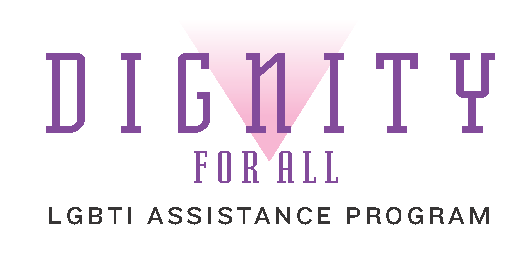-
Advocacy refers to a set of strategic activities that aim to promote change. Advocacy can mean various types of action, such as media campaigns, research publications, lobbying, and public speaking. Advocacy can help to transform attitudes, systems and structures.
Source: https://emergency.unhcr.org/entry/49254/advocacy-in-emergencies
-
Crisis refers to a short period of extreme danger. The Dignity for All program responds to crises affecting LGBTQI+ populations primarily through three short-term mechanisms: rapid-response financial assistance for individuals and CSOs under threat for their human rights work (emergency assistance); project funding to CSOs/groups for time-sensitive initiatives (SOAR grants); and holistic safety and security trainings, including well-being and digital security (security trainings).
Source: https://ccaha.org/resources/emergency-management-terminology
-
CSO stands for civil society organization, meaning non-state, not-for-profit groups formed by people in the social sphere. CSOs can be local, national, or international. They perform a variety of services and humanitarian functions, such as bringing citizens’ concerns to governments, monitoring policies, and encouraging political participation at the community level.
-
An emergency is a serious, unexpected, and often dangerous situation requiring immediate action. Within the context of the Dignity for All program, an emergency is defined as a situation that poses an immediate risk arising from work on LGBTQI+ human rights.
Source: https://ccaha.org/resources/emergency-management-terminology
-
Emergency assistance means aid provided in the face of an emergency, including but not limited to services, equipment, materials, and/or supplies. The Dignity for All program provides emergency assistance in the form of financial support for expenses including but not limited to legal representation, prison visits, trial monitoring, medical expenses, temporary relocation, dependent support, and security and equipment replacement.
Source: https://www.lawinsider.com/dictionary/emergency-assistance
-
The acronym HRD refers to human rights defenders, meaning people who, individually or with others, act to promote or protect human rights, from civil and political rights to social, cultural, or economic rights.
Source: https://www.ohchr.org/en/special-procedures/sr-human-rights-defenders/about-human-rights-defenders
-
Human rights are the basic rights and freedoms that belong to every person in the world, regardless of one’s identities, beliefs, and lifestyle.
Source: https://www.equalityhumanrights.com/en/human-rights/what-are-human-rights
-
LGBTQI+ - LGBTQI+ is an abbreviation for lesbian, gay, bisexual, transgender, queer, and intersex. The plus sign represents people with diverse sexual orientations, gender identities, gender expressions and sex characteristics (SOGIESC) who identify using other terms. In some contexts, LGB, LGBT or LGBTI are used to refer to particular populations. Additional characters may be added, such as A for asexual, agender or ally, 2S for Two-Spirit or P for pansexual. In many locations, the letter order varies, e.g., LGBTQI+ or GBLTQI+. SOGIESC-related acronyms are not static and continue to evolve over time. To ensure inclusivity and accuracy, they should be applied with careful consideration to the individuals or populations being referenced.
Source: https://www.iom.int/sites/g/files/tmzbdl486/files/documents/IOM-SOGIESC-Glossary-of-Terms.pdf
-
Safety typically refers to unintentional acts, events, or hazards. Safety is not the same thing as security, which conversely involves intentional acts. For example, a safety threat to the office of a civil society organization may involve a hurricane, whereas a security threat could involve a break-in.
-
Security primarily involves intentional acts of violence. Security is not the same thing as safety, which conversely involves unintentional acts, events, or hazards. For example, a security threat to a human rights defender may involve targeted violence by the police, whereas a safety threat could arise from unhealthy levels of radiation.
-
Security trainings are one of the three mechanisms of crisis response that the Dignity for All Program facilitates. Dignity for All Consortium partners can facilitate security trainings or CSOs can use SOAR grants to design and implement their own trainings. Security trainings are intended to improve the security and protection capacity of LGBTQI+ CSOs and HRDs, build awareness of risk assessment and mitigation, and allow for the design and implementation of security plans.
-
SOAR grants, which stands for security, opportunity, and advocacy rapid response grants, are one of the funding mechanisms that the Dignity for All Program provides. SOAR grants are intended to provide CSOs with resources to counteract urgent threats and to take advantage of unexpected opportunities to advance the rights of LGBTQI+ people. Grants are flexible and can help CSOs to address proposed or recently passed legislation, sudden government crackdowns, increased levels of violence, unexpected openings in civil society space, urgently needed security assistance and capacity-building for security, and other emergent opportunities or dangers.
-
SOGIESC is an acronym for sexual orientation, gender identity, and sex characteristics. Examples of sexual orientations include gay, lesbian, bisexual, and asexual. Examples of gender identities include cisgender, transgender, non-binary, and genderfluid. Sex characteristics, such as chromosomes, sex hormones, and genitals, define whether someone is intersex or endosex.
Source: https://www.iom.int/sites/g/files/tmzbdl486/files/documents/IOM-SOGIESC-Glossary-of-Terms.pdf
-
A threat can be defined as a declaration or indication of an intention to inflict damage, punish, or hurt, usually in order to achieve something. HRDs and CSOs receive threats because of the impact their work is having, and most threats have a clear objective to either stop what the HRD/CSO is doing or to force them to do something. In the context of the Dignity for All Program’s work, a threat is defined as an indication of intention to cause damage to LGBTQI+ movements and the human rights of LGBTQI+ HRDs.
-
Violence refers to a wide range of experiences, including economic abuse, psychological/emotional abuse, physical abuse, sexual abuse, and institutional and systemic rights violations. HRDs who have engaged in acts of violence are disqualified from receiving Dignity support.

